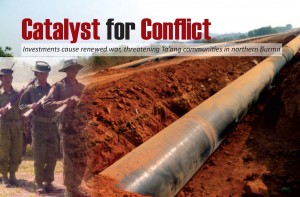Catalyst for Conflict
By Ta'ang Students and Youth Organization • May 23, 2012 Foreign investments are causing increasing conflict and abuses in northern Burma despite recent ceasefire agreements and talk of reform in the country, according to a briefing paper released today by an ethnic Ta’ang group.
Foreign investments are causing increasing conflict and abuses in northern Burma despite recent ceasefire agreements and talk of reform in the country, according to a briefing paper released today by an ethnic Ta’ang group.
Catalyst for Conflict by the Ta’ang Students and Youth Organization (TSYO) documents how Burma Army soldiers deployed to secure Chinese mega projects, including oil and gas pipelines and hydropower dams, have been threatening, extorting money from, and killing local villagers since January this year. In March, two villagers coming back from fishing near a Chinese dam site were interrogated and killed by Burmese soldiers patrolling the site.
The briefing also details how Chinese companies are paying 5,000 kyat (US$6) per day to Burma Army soldiers from local battalions for security around pipelines which will carry oil and gas to China. Control over natural resources and abuses by the Burma Army have been core grievances in both Kachin and Shan states where conflict erupted last year. In July the Ta’ang National Liberation Army (TNLA) was formed and has since launched several attacks against Burmese troops patrolling in Ta’ang areas.
Since December 2011, over 1,000 men, women and children have become internally displaced, sheltering in Nam Kham and Mantong. Many have also fled to China to escape the war. “Foreign investors are cold-bloodedly fuelling war in Burma” said Mai Khroue Dang of TSYO. “All mega projects should be suspended until Burmese troops withdraw and political dialogue leads to a meaningful resolution of conflict.”
The Ta’ang, also known as Palaung, are an ethnic group numbering an estimated one million living in the hills of Burma’s Shan State and China’s southern Yunnan province.
Contact: Mai Aung Ko, Lway Phoo Reang, Mai Khoure Dang
Phone: 080118 4479, 0800 580 720, 0845 739 331
Download the briefing paper here.
Tags: Armed Conflict, Foreign Direct Investment, Investment, Palaung, Shan State, Ta'ang Students and Youth OrganizationThis post is in: Business and Human Rights, Crimes Against Humanity, Economy, Human Rights, Spotlight
Related PostsBurma Army Displays Blatant Disregard for 21st Century Panglong Peace Process
On Union Day, Reappraisal of the Peace Process is Needed
ရွမ္းျပည္တိုိးတက္ေရးပါတီ၊ ရွမ္းျပည္တပ္မေတာ္ SSPP/SSA ထုတ္ျပန္ေၾကညာခ်က္
Time for the Government to Accept the Reality of Human Rights Problems, Take Effective Measures and Move Forward
Kachin Region: War Torn Displaced Village Profiles









 All posts
All posts